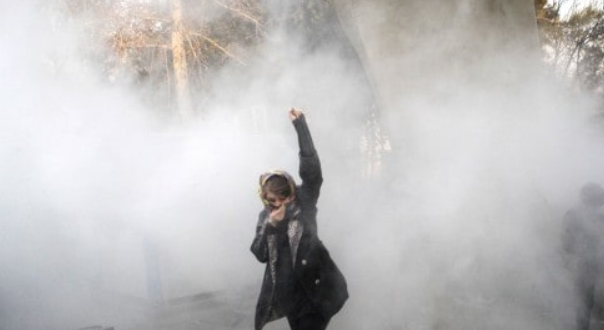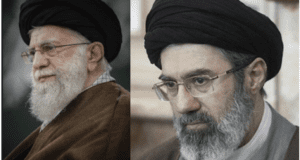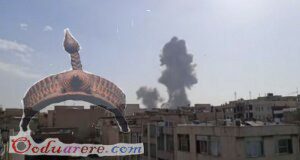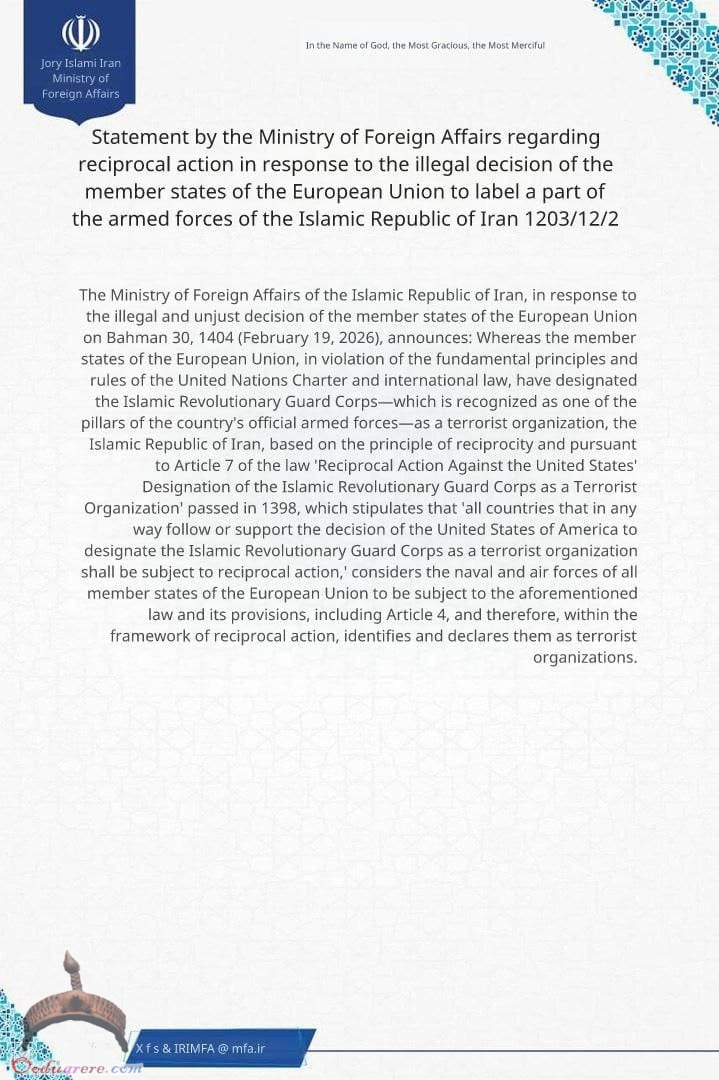by Ramin Mazaheri for the Saker blog
I am on vacation and trying to stay away from politics to recharge my batteries, but a sane voice on Iranian politics in English is almost impossible to find, so….
Despite the Western media’s slobbering at the minor protests in Iran, there is no need to fear that Iranian democracy is about to “fall”. Allow me to get right to the heart of the matter and prove why:
What did the 2009 protests prove?
Firstly, that opposition to the Iranian system is obviously a minority, which was immediately indicated back then by the fact that the pro-Ahmadinejad counter-protests were larger – a rarely reported fact. Today there are major pro-government counter-protests now planned all over Iran, but good luck hearing much about that either.
Secondly, and more importantly – and this cannot be disputed whatsoever:
Exactly like in Venezuela this year – there is a hardcore, GRASSROOTS system of citizen supporters who will defend the Iranian Revolution with their lives…because they feel the Iranian Revolution (like Chavismo) has benefited the average citizen so very much. That’s why Venezuelan democracy didn’t fall – it was due to the common person attending a counter-protest, maybe even wielding a garden tool. This is what preserved Venezuelan democracy – not state military action – and this is also what happened in Iran in 2009.
So Iran 2009 and Venezuela 2017 proved that Mao was wrong when he said “Political power grows out of the barrel of a gun” – if you have enough of the People, all you really need is a makeshift club.
Because true politics – which is far different from pathetically snarky discussions on TV – is ultimately about People Power, and Iran’s government has the People clearly on their side. 2009 proved that if you push the Iranian People to the brink, you will be confronted with their power. (Iran is NOWHERE near the brink right now, of course.)
Iran’s Basij Resistance Bases – or volunteer militias, in Western terms – are far more deeply embedded in all levels of society than Chavismo colectivos. They are more more akin to the Chinese Communist Party (minus the formalised and incredibly rigorous testing and selection policy) as they compose perhaps 11 million people in an 80-million person country. Strikes are basically the only way to get any revolution going, but good luck getting an unjust strike past the Basij branches which are set up among unions, professional organizations, civil servants groups, student groups, industrial workplaces, etc.
And most of these members are unpaid. And they have families who likely feel similarly. And they have friends who clearly aren’t opposed to them…because they are still friends, after all.
So, you see…we are not talking about a “group” – we are basically talking about half of Iran.
Now you can ignore the ironclad reality of such grassroots (i.e. popular democratic) support all you like, but you will never defeat them internally. Never.
For that, as Libya proved, you need NATO bombs. There was huge internal support for the Libyan system: I was there when it started, and I witnessed pro-Ghadaffi protesters, and I was awed by their intensity – but they were overwhelmed by US and French bombs, 40 tons of illegal arms drops by France, a naval and air blockade spearheaded by the UK, Canada and all of Western Europe, etc.
So the analysis above should answer the question on every idiot Western commentator’s lips regarding a possible “fall” of Iran. I simply say: How do you account for the already-proven massive number of people willing to forget about political niceties/compromises and fight FOR Iran’s government?
This is not “tough talk” or “nationalistic talk” on my part – this is reality, and it must be accounted for in any discussion which claims to be serious (or worth having).
Foreign interventions and false flags – also not a worry for Iran
What must also be remembered is that Iran already had their “NATO intervention” – it was called the Iran-Iraq War. For 8 horrible years the West foisted Iraq on Iran, supplied Iraq with weapons, turned a blind eye to the worst chemical weapons atrocities since World War One, and did all they could to create, prolong and influence the deadliest war in the last quarter of the 20th century.
And it was still not enough.
A 2nd phony Western war would also totally backfire in 2018 – have no doubt about that. The Iran-Iraq War created a nationalist unity which Libya did not have; Libya’s revolution did create the highest standard of living in Africa and fewer poor people than the imperialist Netherlands (and free loans, education, health care, etc.), but it was never really tested. Syrians, on the other hand, will soon enjoy a nationalist unity also forged in the crucible of a horribly unjust war.
So there are simply not the type of divisions in Iranian society which the West was able to exploit in Libya. A 2nd phony Western war would undoubtedly be met with a largely-unified response to expel the invaders and Iran would never be fooled by their phony promises; this is evidenced by massive popular support for our right to nuclear energy, even though it is (allegedly) the main source of inhumane sanctions. The Iran-Iraq War not only “made the bones” of the Iranian system, but it is remembered and feared – a return to that will be wildly, massively opposed.
Iran is, in this sense, like Cuba and China: a revolutionary country full of many revolutionaries. There is no irony in their politics, nor any going back.
Iran is definitely one step ahead of Venezuela in another way: their government is not revolutionary, after all, but based on a democratic support for Chavismo that is fundamentally bourgeois (West European democracy). I am not denigrating Venezuela, but they have never instituted the fundamental, wholesale changes which countries like Cuba, China, Vietnam, Eritrea and others have implemented. This commitment to “playing by the rules” of a bourgeois democratic system leaves them very vulnerable and almost welcoming of the very forces which want to destroy the gains democratically won by Chavismo.
And it was not enough in Venezuela, too – Chavismo is still standing. It’s bruised, bloodied and shaky, but it’s still there despite the vast US-led effort against it. The source of the reactionary-foreign capitalist pact against Venezuelan socialism was because Chavistas are, correctly, starting to implement Cuban-style changes to their governmental structure in order to become less bourgeois and more poplar democratic.
What’s a more realistic fear? A Ukraine-style false flag operation.
I recently re-broadcast a totally-ignored Italian report on 3 snipers who admitted they were paid to shoot at both sides at Ukraine’s Maidan. That caused the killing of 100 people, massive chaos, the subsequent discrediting of the government and then what still reigns today – horrible civil war.
However, Ukraine is no revolutionary society. The Iranian government would not, and should not, permit an encampment like at Ukraine’s Maidan. Iran is a country which has been besieged by foreign forces for decades, and is no position to allow an “Occupy” type of protest at Zuccotti Park in New York City (razed at night after less than 2 months, with more repression to prevent their return; that’s a slightly better democratic score than other Occupy protests in the US which were stopped much sooner; and a far better score than France, who rousted out their Nuit Debout protesters in Paris every single night, forcing them to rebuild the following day.) because we all know that it would be filled with 10 times more foreign operatives than in Ukraine, i.e., it cannot possibly be as democratic is it would claim to be. There would be Mossad, CIA, MKO, Al-Qaeda, ISIL, Mi5, DGSE and truly the worst of the worst in the world. You cannot compare the US and Iran; Iran is fighting for its life and its sovereignty, while the US government fights to preserve its capitalist inequality.
However, all those foreign, murderous groups will have no problem creating a sort of false-flag which kills hundreds and hundreds of innocent Iranians if it means installing a compliant billionaire puppet like in Ukraine – Iran is far, far richer than Ukraine, after all. And Iran is also the only thorn in the side of Western imperialist capitalism in the Muslim world.
With great power comes great responsibility, and thus Iran’s government is not about to allow a Ukraine-style Maidan to occur. Staggeringly, Iran has seen 17,000 people killed by terrorists since 1979; during this year’s ISIL attacks there was no overreaction such as installing a 2-year state of emergency like in France. Iran both does not mess around with risks and does not needlessly antagonise their own people (which actually means to make another risk).
Two people have died in the protests, and the government declared that security forces fired no bullets, and attributed the death to foreign agents. Given what has happened in Ukraine (and hundreds of other places over the years), and given the massive democratic support the government has…it would be insane and illogical to rush to judgment against the government.
Of course, this is exactly what the Western media is doing. They will desperately blow this out of proportion. They will salivate at the protests, dissimulate regarding their own hypocrisies, agitate for war, and all because they are so desperate to push their anti-Iranian agenda. This is textbook, and the historical modus operandi, and it will not change when the Western calendar turns to 2018 in around 12 hours.
It will likely work to great effect outside of Iran, but inside? No way. Iran is too busy trying to repair our issues – which every society has because humans are not perfect – to be fooled by tabloid journalism.
Are Iranians not permitted to have normal protests?
These protests are economic. Have you not noticed that these have swept much of the world for the past decade?
You might have an insane MKO cult member willing to burn a poster of Khamenei – giving the Western media the chance to blow that out of proportion – but this is an economic protest. But these are not a fruit-seller setting himself on fire, like in Tunisia, to desperately protest corruption, harassment and everyday brutality.
Protests are not unknown in Iran society: Has your country pulled off a silent march larger than Iran in 2009? Remember the silent marches of 2009? 1979 saw more than a small bit of protesting too, let’s remember. These protests are akin to the 3-500 protests per day in supposedly-undemocratic China: more effective government policies are being called for, not a whole new government!
Because these protests are economic, I will insist that the West give the Iranian government as much leeway as they take for themselves when confronted with similar demonstrations.
Waitaminut…I sure hope Iran is not THAT bad!
Because during the age of austerity I have been tear gassed too many times to count while covering economic protests in France. Only because I am a foreign journalist, I have not been among the thousands of arrested pro-democracy protesters; there have been hundreds of banned protests (how many more chilled into silence and thus strangled in the cradle?); plenty of harsh jail sentences of leading activists; countless people hurt by batons and water cannons amid total Western media silence; countless protesters cowed by invasive searches by riot police and the guarantee of rough treatment.
But where were the Western calls for “regime change” in France, like which are pouring from the mouths of Western commentators?
When Hollande and Macron forced through by executive order the widely-opposed capitalist laws which sparked the anti-government protests, where are their accusations of “authoritarianism”?
Of course there were none.
Ugh. I just remembered I’m on vacation…I shouldn’t be wasting me time trying to point out that Iran’s government doesn’t needs to defend their actions to Westerners….
But the crimes of capitalism do not take a vacation
The truth is that Iran’s economic policies – like China, Cuba and everyone else – have been negatively tainted by the anti-socialist and neoliberal ideas which swept the world after the fall of the USSR.
While Iran has implemented an army of pro-socialist ideas which have undeniably redistributed wealth in an amazingly effective fashion, they have also pursued some pro-capitalist and pro-neoliberal ideas – this trend has spared no nation since 1991. The recent economic choices of Cuba and China are no different, but even though Marx said we must use the tools of capitalism in order to create socialism…that necessarily creates economic problems.
Now without a doubt, the main problem with Iran’s economy is simple: international blockade. It is deranged to believe otherwise.
However, the protests can be interpreted as evidence that experimentations with capitalism have not worked – indeed, they never have and never will. Neoliberalism has led to what it always does – inefficiency and ineffectiveness.
These protests are the same as in France: against decreased purchasing power and unemployment. Can’t we have a “normal” protest, LOL? It is sad, but many have been led to believe that Iranians are aliens, but our problems are actually the same as yours!
But Iran does have much better alternatives, however: Khamenei’s pushing of a “resistance economy” – meaning a nationalist economy which rejects capitalism – is in direct opposition to neoliberalism. But – NEWS FLASH – Iran is a democracy; Khamenei is not anything close to an absolute ruler (the translated title of “supreme leader” is quite misleading, LOL); there are supporters of capitalism in Iran.
Thankfully, supporters of capitalism are a minority, as Iran follows what I have termed “Iranian Islamic Socialism”. These protests will lead to economic changes which implement more Islamic and socialist economic principles.
As we all know, these are two things which the Western media hates.
And thus, the Western media wants to ignore these complaints – which reflect near-universal economic hardship amid the Great Recession (even in non-blockaded countries) – and portray all protesters as pushing for the downfall of the Iranian system.
That’s nonsense, and it won’t happen. The reason why is simple: there is widespread democratic support for Iran and the popular, democratic revolution which set up the current system. Again, I am on vacation and I won’t waste more time telling people that the sky is blue – stick your head out the window and if you still disagree: it must be nighttime, you blockhead.
A minor point: a common Western trope is that these protests are in response to the “wasted resources” caused by lending support and solidarity to places like Palestine, Syria and Iraq. However, polls of Iranians show there is massive support for giving material and military support to these countries. (“In general, to what degree do you support or oppose Iran providing help to”: Hezbollah (71% approve), government of Assad (66% approve), Hamas (70% approve) Shiites and Kurds in Iraq fighting ISIL (88% approve), Iran should send military personnel to Syria(63% approve)) Clearly, the naysayers are in the minority: therefore, changing these policies would be undemocratic. Of course, the West would be ecstatic if Iran was no longer around to thwart their imperial projects. However, Iran’s politicians work in a democracy: if they want to win re-election, they will continue with these popular policies.
A final point: Why are democratic protests for policy reform a “sign of a vibrant and healthy democracy” when they occur in the West…but “an indicator people want to bring down the system” whenever they occur in non-Western countries? Ultimately, these protests will be heeded and, like all genuine protests, will make Iranian democracy stronger and the country better.
But as far as believing the Western media’s coverage of Iran’s protests – which is both uninformed and not remotely objective (and capitalist-imperialist, of course) — I suggest following my lead: enjoy your vacation instead.
Happy Western New Year to all!
Ramin Mazaheri is the chief correspondent in Paris for Press TV and has lived in France since 2009. He has been a daily newspaper reporter in the US, and has reported from Iran, Cuba, Egypt, Tunisia, South Korea and elsewhere. His work has appeared in various journals, magazines and websites, as well as on radio and television. He can be reached on Facebook.
 Ọmọ Oòduà Naija Gist | News From Nigeria | Entertainment gist Nigeria|Networking|News.. Visit for Nigeria breaking news , Nigerian Movies , Naija music , Jobs In Nigeria , Naija News , Nollywood, Gist and more
Ọmọ Oòduà Naija Gist | News From Nigeria | Entertainment gist Nigeria|Networking|News.. Visit for Nigeria breaking news , Nigerian Movies , Naija music , Jobs In Nigeria , Naija News , Nollywood, Gist and more









